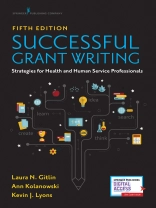Note to Readers: Publisher does not guarantee quality or access to any included digital components if book is purchased through a third-party seller.
Following in the tradition of its previous editions, the updated and fully revised fifth edition of this classic guide to grant writing is especially written for health and human service professionals. It provides a comprehensive, systematic, and easy-to-follow stepwise guide to writing competitive grant proposals for research, education, innovative practices, and demonstration projects. Never has the need to advance evidence to improve the health of the public been greater. Generating evidence requires funding, and grant writing has become an essential activity for every health and human service professional who must seek funds to advance innovative research, education, and practice initiatives.
Uniquely focused on developing grant-writing skills as part of a professional’s career, this one-of-a-kind guide addresses the full range of essential competencies needed to ensure success. The new edition expands coverage on how to compose an effective aims page, explains how to write a compelling literature review to support significance of a proposal, and describes considerations for specific types of study designs. Additionally, the guide provides a more extensive discussion of mentorship, plus tips for predoctoral students and postdoctoral fellows.
- NEW TO THE FIFTH EDITION:
- Spotlights important new trends that can make or break grant success
- Features Professional Spotlights reflecting the experiences and advice from successful grant writers – from novice to expert
- Highlights special considerations for predoctoral students and postdoctoral fellows
- Examines how to write effective grant applications for specific types of study designs
- Explains how to craft compelling statements about significance and innovation
- Provides guidelines on mentorship
- Covers ways to manage postaward activities and offers strategies and templates for documenting grant progress
- KEY FEATURES:
- Key summary points in every chapter
- Case examples throughout
- Strategies for managing a grant-writing team and postaward activities
- Considerations in building a grant-writing career and matching your level of experience to funding mechanisms
- Testimonies from novices and experts describing their unique grant-writing experiences
Daftar Isi
Contents
Contributors
Foreword
Foreword
Preface
Acknowledgments
Introduction
PART I: GETTING STARTED
1. Why Write a Grant?
2. Becoming Familiar With Funding Sources
3. Developing Your Ideas for Funding
4. Infrastructure to Support Grantsmanship
5. Everyone Needs a Mentor
PART II: WRITING A COMPETITIVE GRANT APPLICATION
6. Strategies for Effective Writing
7. Overview of Common Sections of Proposals
8. Heart of the Matter: The Aims
9. Background and Significance
10. The Approach
11. Concept Papers, Pilot Studies, and Supporting Documentation
12. Common Pitfalls in Proposals
PART III: PREPARING A BUDGET
14. Putting It All Together to Create a Budget
15. Technical Considerations in Budget Development
PART IV: MODELS FOR PROPOSAL DEVELOPMENT
16. Four Project Structures
17. Understanding the Process of Collaboration
18. Collaborating for Team Science
PART V: SUBMITTING THE PROPOSAL
19. Learning About Your Institution
20. Electronic Considerations
PART VI: LIFE AFTER A GRANT SUBMISSION
21. Understanding the Review Process
22. Responding to the Proposal Review
PART VII: STRATEGIES FOR MANAGING A GRANT AWARD
24. Building a Program of Research
25. A Case Study: Putting It All Together
Appendix A Common Questions and Their Answers
Appendix B Selected Key Acronyms
Appendix C Guidelines for Evaluating Collaborative Teams
Index
Contributors
Tentang Penulis
Kevin J. Lyons, Ph D, has over 40 years of experience in higher education as a faculty member and administrator. Dr. Lyons is one of the founding members of the American Interprofessional Health Collaborative. He has also served on the Board of Trustees for Rocky Mountain University of the Health Professions.












